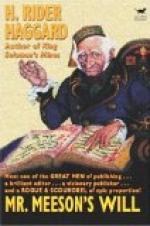“One question only seems to me to remain. Is there anything to show that the testator was not, at the time of the execution of the will, of a sound and disposing mind? and is there anything in his conduct or history to render the hypothesis of his having executed his will so improbable that the Court should take the improbability into account? As to the first point, I can find nothing. Miss Smithers expressly swore that it was not the case; nor was her statement shaken by a very searching cross-examination. She admitted, indeed, that shortly before death he wandered in his mind, and thought that he was surrounded by the shades of authors waiting to be revenged upon him. But it is no uncommon thing for the mind thus to fail at the last, and it is not extraordinary that this dying man should conjure before his brain the shapes of those with some of whom he appears to have dealt harshly during his life. Nor do I consider it in any way impossible that when he felt his end approaching he should have wished to reverse the sentence of his anger, and restore his nephew, whose only offence had been a somewhat indiscreet use of the language of truth, the inheritance to vast wealth of which he had deprived him. Such a course strikes me as being a most natural and proper one, and perfectly in accordance with the first principles of human nature. The whole tale is undoubtedly of a wild and romantic order, and once again illustrates the saying that ‘truth is stranger than fiction.’ But I have no choice but to accept the fact that the deceased did, by means of tattooing, carried out by his order, legally execute his true last will in favour of his next-of-kin, Eustace H. Meeson, upon the shoulders of Augusta Smithers, on or about the 22nd day of December, 1885. This being so, I pronounce for the will propounded by the plaintiff, and there will be a grant as prayed.”




